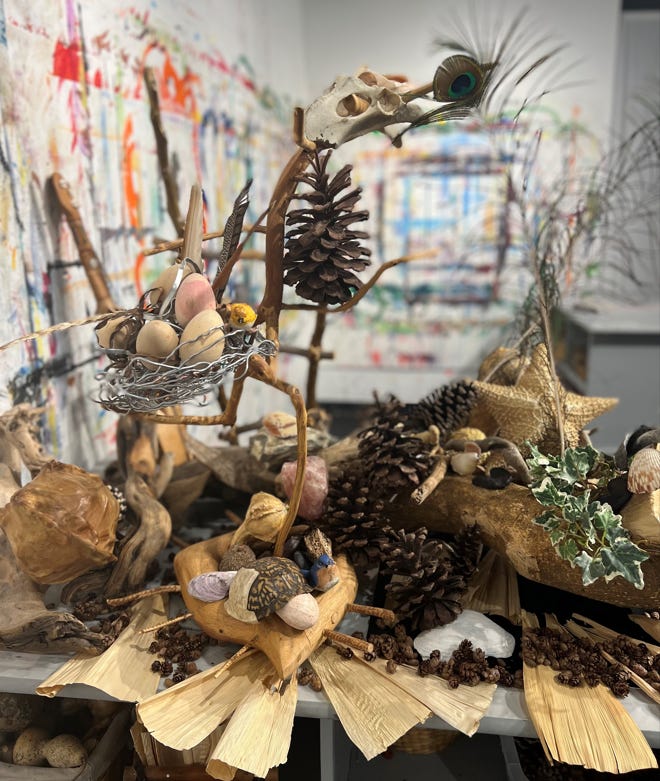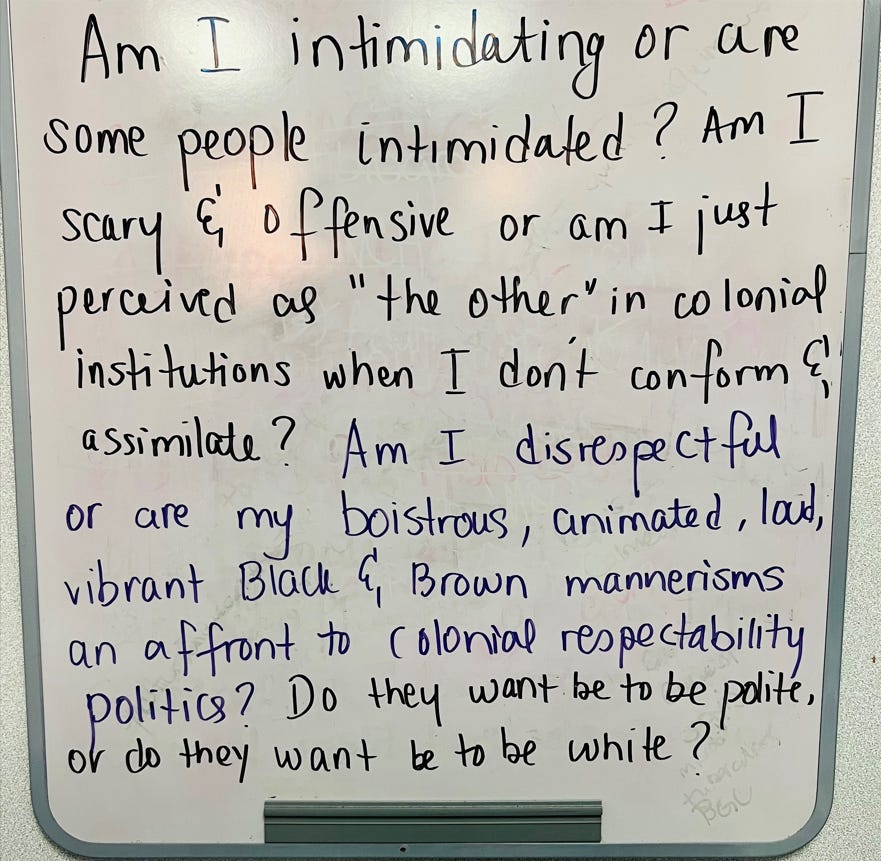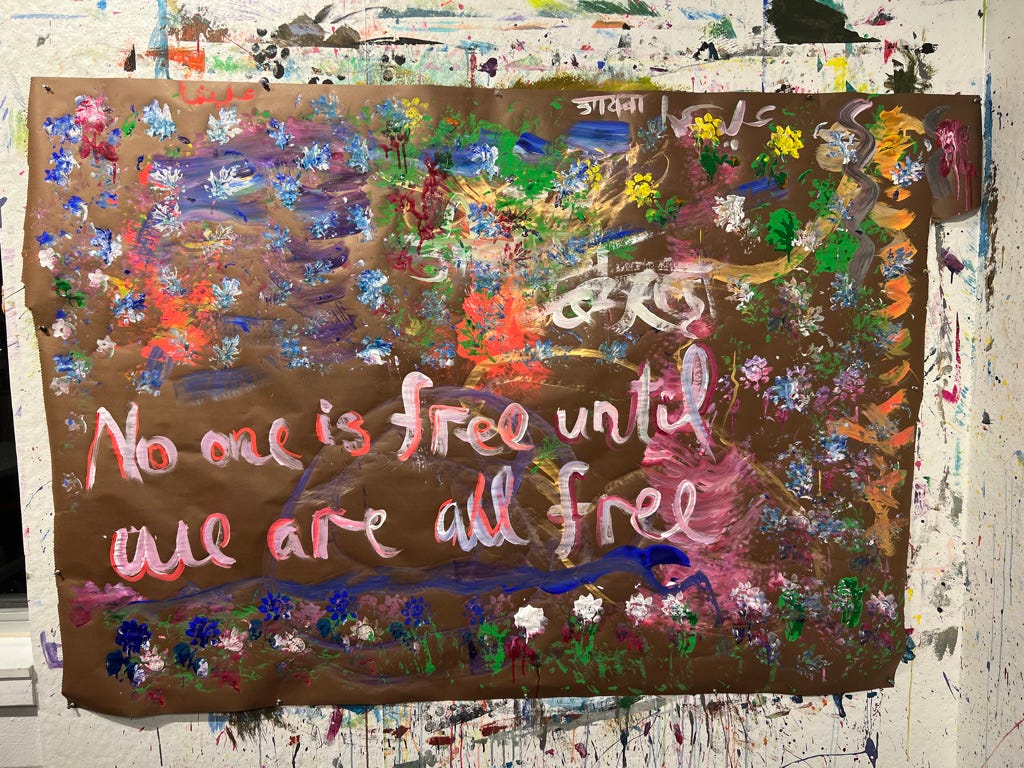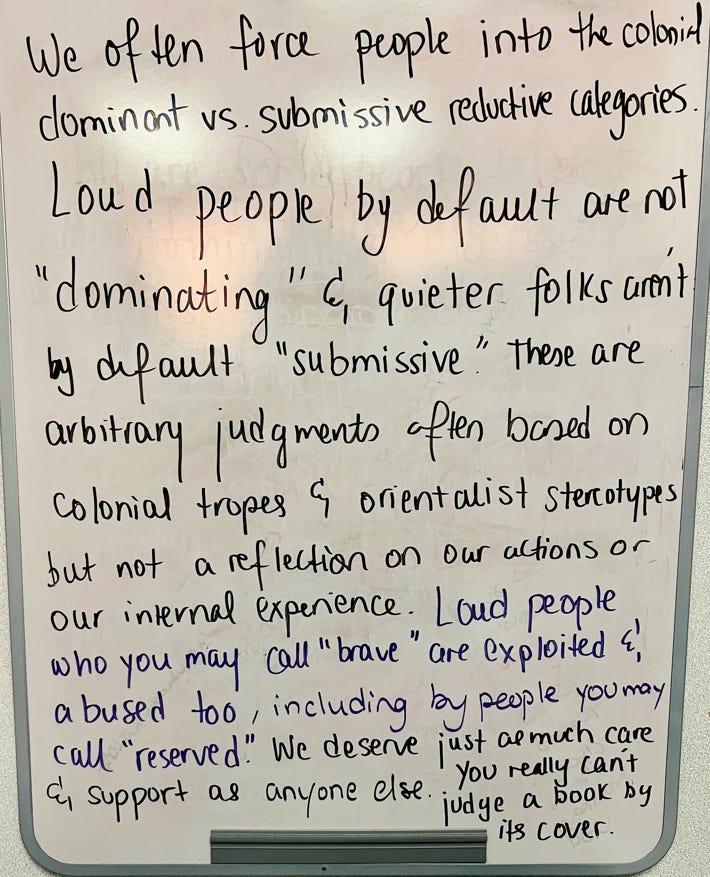Hello friends, this topic will be split into 2 newsletters. Today we’ll focus on:
How oppressive systems objectify & socialize us to judge books (people) by their covers (arbitrary superficial traits), leading to stereotypical assumptions made about people
Reflect on the macro-aggressions you’ve experienced in institutions/ at work and think about picking your battles.
Paid subscribers: In the video, I share personal examples & ways I’ve coped. At the bottom of this newsletter, I’ve included decolonized healing inspo featuring pictures I captured recently of art & nature just for you <3
The next newsletter will dive into how we perpetuate these individualistic norms, why our feelings aren’t always valid & how we can practice complexity or discernment.

Audacity of the oppressed
My whole life- within any colonial, western institution, there’s been consistent patterns with how people perceive me & make assumptions about me based on oppressive tropes or stereotypes. The most common in academic institutions has been how people often label me as intense, intimidating, aggressive, abrasive, arrogant, or straight up ‘scary’. Ironically, almost always, these are accusations from people who I’ve had little to no direct interaction with or people who don’t know me well but presume they do based on assumptions, judgments, subjective conclusions they’ve drawn by observing me & my mannerisms without ever allowing me the opportunity to speak for myself or exist as my authentic self.
The more one stands out & is unable to code switch, mask or conform & assimilate, the more they are framed as the “other”. From my skin, my physical features, my curly hair, my tattoos, to my loud boisterous voice, animated gestures, non-binary ways of being, hyperactivity, energetic & flamboyant body language, vibrant ethnic clothing, explosive laughter & so on… I am quiet often “the other” in most public spaces that I traverse. You are all impacted by stereotypes of what it means to be “polite” or respectful or professional. Think about it, who sets the standard & does someone giving the illusion of being polite mean ANYTHING about how kind, compassionate or principled they actually are? What is are ideal markers of a polite yet confident, professional yet bold & modest yet successful person?

Capitalism socializes us since birth to judge a book by it’s cover & constantly focus on building our own brand/ image or curating our CV/ resume to give people the illusion of perfection. We’re constantly reducing ourselves to cover letters, personal statements, curated social media profiles that fail to capture our innate complexity. We’re taught that society’s perception of us matters more than who we authentically are and how we authentically feel so no wonder we’re stuck judging or making assumptions about each other. We’re raised to mold ourselves with the values of the empire. We’re also constantly evaluated, assessed, tested, measured & quantified by capitalist systems starting with K-12 colonial education’s obsession with grades, exams, standardized tests & competition. We’ve become gradually accustomed to reducing each other to a superficial reductive stereotype because capitalism reduces us to numbers from a dollar sign determining our “net worth” to credit scores, GPA, IQ, reductive personality tests, licensing exams, and “success” in general based on your ability ruthlessly pursue the title of being #1 (whatever that means). Ironically, these numbers mean nothing but capitalism fabricates their meaning to breed competition & individualism. When we don’t question how we’ve been socialized under oppression, we repeat this cycles of violence.
“Micro” aggressions are macro, it’s like death by a thousand paper cuts
Being exotified & judged for merely existing is one of the most demoralizing, traumatizing & draining “micro” aggressions because it’s a form of policing & imprisonment. The thing is whatever is labeled as ‘implicit’ bias is actually extremely explicit bias but the word implicit is meant to rid the institution or absolve someone embodying oppressive values of any guilt by minimizing the impact on the person being harmed. Whatever is labeled as a microaggression is in fact a very MACRO aggression. Colonialism/ capitalism is defined by individualism and this means problems are reduced to individuals so “micro aggressions” are treated as isolated incidents without the sociopolitical context of the grand systems of oppression that we exist within making these so called isolated incidents not isolated at all but actually VERY common and a daily experience for many. The more marginalized identities you hold, the more boulders on your back. Oppression can be overt violence like poverty, incarceration, displacement or more covert like being forced to conform/ assimilate to colonial norms while facing countless ‘micro’ aggressions the more you stand out. A paper cut in isolation is just a paper cut but these aggressions accumulate & compound to eventually lead to death by a thousand paper cuts.
So why is it so hard for people to call it what it is? Our oppression has been normalized and is often diluted which is how we are gaslit. Over our lifetime, violence is titrated out and gradually exacerbated in ways where it begins to define our reality. It’s all we’ve ever known. Any amount of brutality & violence can become “normal” under systems of oppression. The state tries to shape our perception of the world to prevent us from imagining alternatives or questioning what we’re told is real & inevitable.

Working class people are subject to macro aggressions
When you’re told to be grateful for the crumbs that are thrown at you- that is a macro aggression. When you’re told by your job that you should be grateful for how much you make, the vacation you may get, for weekends, for the work you should be oh so blessed to take on, the responsibility handed to you, the labor being demanded of you, etc- these are all MACRO aggressions. You may even feel humiliated, patronized, belittled, insulted, or just ANGRY or SAD without being able to really figure out if your emotional response “matches” the scale of the situation in front of you. If we pushback, we’re told to relax, to calm down, to not make a “big deal” as though we are overreacting to a single one off situation when in reality- oppression works by slowly titrating violence over time. Again, an individual paper cut on its own is “not a big deal” but that leads to us fielding millions of cuts and death by a million paper cuts one could argue is even more brutal than just having my neck sliced clean. This is what capitalism does to us. The crumbs it throws us are not morsels of kindness, they are our chains.

How the “loud & strong ones” are abandoned
Some people often get labeled as loud, confident, brave, strong, domineering or bold and these are all subjective assessments not based on our internal experience & often not supported by us sharing how we actually feel. However, we’re in a culture that judges books by covers so people make assumptions based on their subjective assessments and presume those assumptions to be “true”. Often, the “loud ones” are framed as unlikely to be exploited, walked over, humiliated, taken advantage off, dehumanized, or manipulated by others. If we’ve survived adversity, then we are labeled as ‘strong’ & ‘resilient’. This glorification of “how much someone can take” has devastating consequences where those of us who’ve faced atrocities are often the least supported because people presume we’ve got it. This is the logic of individualism- the idea that people should be self-sufficient & independent or any “weakness” is framed as inferiority such that people should be “saved” in a patronizing way.
The “loud intense ones” are in any dynamic more likely to be assumed to be the “dominant” domineering, authoritative figure especially when next to someone who is perceived to be quiet, reserved, docile, submissive which are also belittling tropes that deprive people of agency. It also prevents any true accountability & support from manifesting in our communities. The loud ones are deserving of just as much solidarity, support, aid, & compassion as anyone else. The quiet ones are deserving of just much respect, agency, dignity & autonomy as anyone else. As a loud one, I’m ironically not my best advocate but I can be a lion for others. I struggle to pushback on my own exploitation & abuse but am willing to do anything in a heartbeat to support other folks experiencing similar crises. Our behaviors, personality & mannerisms are shaped by countless, complex, sociopolitical & environmental factors. Things are not black/ white & it can be very hard to bear this in mind when we’re navigating difficult emotions.
My whole life (I’m sure you can relate), I’ve observed both quiet and loud people being a**holes. Anyone can be an a**hole & that’s also what equity means. I know all types of a**holes that carry every identity imaginable. No identity or reductive “personality trait” is immune to accountability. The first thing I observed when I got to the U.S. was how people masked their true feelings with “niceness”. I observed how people had vacant, empty, meaningless conversations because it was a societal expectation that said nothing about how much people cared about each other. People asked “How are you?” rarely caring for the response & people responded with “Good” even if they were very much not good. Everything was about positivity & pretending like we’re happy as opposed to struggling for authentic happiness (hint: because that would mean we decolonize & dismantle capitalism/ colonialism). This says something insidious about capitalist culture- it encourages people to deceive each other constantly. We are rewarded for deception & not for authenticity because it gets in the way of productivity.
If I actually responded with how I’m feeling, cried, screamed, cackled, expressed myself fully- how could we get work done? So we say “good, how are you?” or make some scripted small talk and get back on the hamster wheel. In reality, is anyone okay? I’ve had to reflect on this when I felt jaded meeting new people where I’d almost expect them to be unwilling to go deeper & share something REAL about themselves without trying to tell me what they assume I want to hear. But I realized, my own individualism leads me to make assumptions about people all the time & it take daily practice to discern— when am I preventing myself from getting to know someone authentically and when am I picking up on a lack of alignment & shared values where I can’t possibly be my full self?
Some personal reflections
Watch with a 7-day free trial
Subscribe to Cosmic Anarchy to watch this video and get 7 days of free access to the full post archives.





